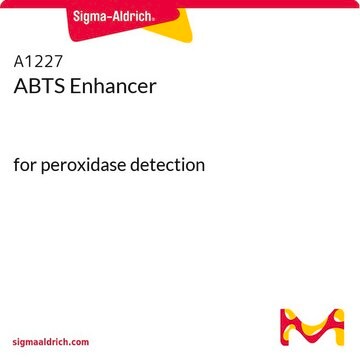11204530001
Roche
ABTS™ Buffer
solution, pkg of 125 mL
Sinónimos:
buffer
Iniciar sesiónpara Ver la Fijación de precios por contrato y de la organización
About This Item
UNSPSC Code:
12352204
Productos recomendados
form
solution
Quality Level
packaging
pkg of 125 mL
manufacturer/tradename
Roche
shipped in
wet ice
storage temp.
2-8°C
Categorías relacionadas
General description
2,2′-azino-di-(3-ethylbenzthiazoline sulfonic acid) or ABTS acts as a substrate for HRP (horseradish peroxidase) conjugate during enzyme-linked immunosorbent assay (ELISA). It is the most sensitive, and stable substrate when compared to three other substrates namely, 5-aminosalicylic acid (5AS), O-phenylenediamine (OPD), O-tolidine (OT). It also produces the best visual results, where it gives a bluish-green color. ELISA using ABTS is a highly sensitive, specific and reproducible technique.
Application
ABTS Buffer is a solvent for ABTS. ABTS solution is the ideal substrate solution for enzyme immunoassays with horseradish peroxidase (HRP) as a marker enzyme. Because of the high sensitivity of the reaction, autoreaders will often display "over" after several minutes.
Preparation Note
Working concentration: Flow cytometry: 0.5 μg/100 μl (106 cells); Immunohistocytochemistry: 50 μg/ml
Working concentration of conjugate depends on application and substrate. Concentrations should be taken as a guideline.
Working solution: Dissolve one ABTS tablet (5 mg) in 5 ml of ABTS buffer. This solution has a light-green color. In microtiter plates, the solution is colorless A405 nm/1 cm should be <0.16. Work as clean as possible. Heavy metal ions or traces of peroxidase can produce a dark green ABTS solution. Such solutions are not suitable for the assay.
Working concentration of conjugate depends on application and substrate. Concentrations should be taken as a guideline.
Working solution: Dissolve one ABTS tablet (5 mg) in 5 ml of ABTS buffer. This solution has a light-green color. In microtiter plates, the solution is colorless A405 nm/1 cm should be <0.16. Work as clean as possible. Heavy metal ions or traces of peroxidase can produce a dark green ABTS solution. Such solutions are not suitable for the assay.
Other Notes
For life science research only. Not for use in diagnostic procedures.
Legal Information
ABTS is a trademark of Roche
wgk_germany
nwg
flash_point_f
No data available
flash_point_c
No data available
Certificados de análisis (COA)
Busque Certificados de análisis (COA) introduciendo el número de lote del producto. Los números de lote se encuentran en la etiqueta del producto después de las palabras «Lot» o «Batch»
¿Ya tiene este producto?
Encuentre la documentación para los productos que ha comprado recientemente en la Biblioteca de documentos.
Los clientes también vieron
Patrik Erlmann et al.
Molecular biology of the cell, 20(20), 4400-4411 (2009-08-28)
Deleted in Liver Cancer 1 (DLC1) is a GTPase-activating protein (GAP) with specificity for RhoA, RhoB, and RhoC that is frequently deleted in various tumor types. By inactivating these small GTPases, DLC1 controls actin cytoskeletal remodeling and biological processes such
C Lindenthal et al.
Infection and immunity, 69(1), 52-57 (2000-12-19)
Enterotoxigenic Escherichia coli (ETEC) is capable of invading epithelial cell lines derived from the human ileum and colon. Two separate invasion loci (tia and tib) that direct noninvasive E. coli strains to adhere to and invade cultured human intestine epithelial
Bruce S Sachais et al.
Blood, 120(5), 1137-1142 (2012-05-12)
Rapid laboratory assessment of heparin-induced thrombocytopenia (HIT) is important for disease recognition and management. The utility of contemporary immunoassays to detect antiplatelet factor 4 (PF4)/heparin antibodies is hindered by detection of antibodies unassociated with disease. To begin to distinguish properties
H Matsuda et al.
The Japanese journal of experimental medicine, 54(3), 131-138 (1984-06-01)
A micro-technique of enzyme-linked immunosorbent assay (ELISA) using ABTS, 2,2'-azino-di-(3-ethylbenzthiazoline sulfonic acid), as a substrate for horseradish peroxidase (HRP) conjugate was studied. In a comparative study among 4 substrates, namely; 5-aminosalicylic acid (5AS), O-phenylenediamine (OPD), O-tolidine (OT) and ABTS, for
Nuestro equipo de científicos tiene experiencia en todas las áreas de investigación: Ciencias de la vida, Ciencia de los materiales, Síntesis química, Cromatografía, Analítica y muchas otras.
Póngase en contacto con el Servicio técnico








